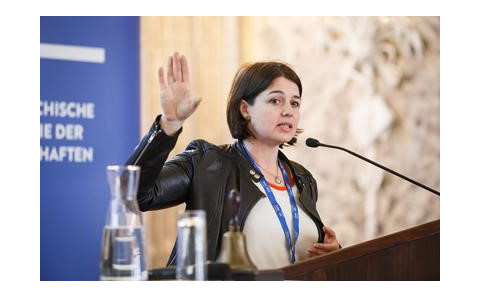Dr Rosalind Coggon Awarded 2021 Asahiko Taira International Scientific Ocean Drilling Research Prize

Royal Society University Research Fellow, Dr Rosalind Coggon, within the University of Southampton’s School of Ocean and Earth Science has been awarded the prestigious international prize in recognition for her outstanding transdisciplinary research accomplishment in ocean drilling from the American Geophysical Union (AGU).
Dr Coggon is the seventh recipient of this prize since its inception in 2015 and only the second woman to have received it. Previous recipients also include another University of Southampton researcher Professor Heiko Paelike (2004-2012).
The Asahiko Taira International Scientific Ocean Drilling Research Prize is given annually in recognition of outstanding contributions to scientific ocean drilling to an honouree within 15 years of receiving their PhD. It is funded by the International Ocean Discovery Program (IODP) and is given in partnership between AGU and the Japan Geoscience Union (JpGU).
AGU awarded Dr Coggon the prize in recognition of her “outstanding achievements and contributions by pushing the frontiers of our science forward.” She was also praised for “embodying AGU’s shared vision of a thriving, sustainable, and equitable future for all powered by discovery, innovation, and action and doing this with integrity, respect, diversity, and collaboration while creating deep engagement in education and outreach”.
This year’s honourees will be recognised at the annual Honours Ceremony and Banquet held on Wednesday, 15 December at the AGU Fall Meeting 2021 in New Orleans, LA.
Dr Rosalind Coggon comments, “I feel extremely honoured to receive the prestigious Taira Prize. I am proud that my work to date to lead the International Ocean Discovery Program Science and in particular my involvement in leading the development and production of The 2050 Science Framework: Exploring Earth by Scientific Ocean Drilling - has been recognised in this way.”
Dr Coggon is Co-editor of the
2050 Science Framework
that guides multidisciplinary subseafloor research into the interconnected processes that characterize the complex Earth system and shape our planet's future. The 2050 Science Framework has a 30-year outlook, inspiring state-of-the-art approaches for scientific ocean drilling far into the mid-21st century.
The 124-page document guides scientists on the important research frontiers that scientific ocean drilling should pursue and often that only can be achieved through scientific ocean drilling. The framework focuses on the many ways in which scientific ocean drilling will increase our understanding of the fundamental connections among Earth system components, while addressing a range of natural and human-caused environmental challenges facing society.
Download the 2050 Science Framework
Dr Rosalind Coggon continues, “The Science Framework is a document that forms the foundation for scientific ocean drilling from 2023 to 2050. It is designed to inspire new approaches and guide multidisciplinary scientific research below the seafloor, helping researchers to identify important science questions that can only be answered by scientific ocean drilling.”
Professor Mark Moore, Head of the School of Ocean and Earth Science said: “Many congratulations to Roz for this very richly deserved recognition of her contributions to the International Ocean Discovery Program, including leading on leadership of drilling expeditions and in the development of the new science framework for the future of ocean drilling.”
Dr Rosalind Coggon explains how her research interests developed, “I came to Southampton as a PhD student in 2001 to investigate hydrothermal alteration of ocean crust exposed on sub-Antarctic Macquarie Island - which involved a one-month fieldwork program on the Island as part of the 56th ANARE (Australian National Antarctic Research Expedition). I also got the opportunity to join a two-month scientific ocean drilling expedition (ODP Leg 206).”
Dr Coggon adds, “I am particularly excited that our students will benefit from the 2050 Science Framework and they will be able to work on major research projects to show the international community how our Earth works and how it will respond to critical changes in the future. For all our students who are interested in staying in marine science, their research will likely be influenced by this ocean drilling data in some way.”